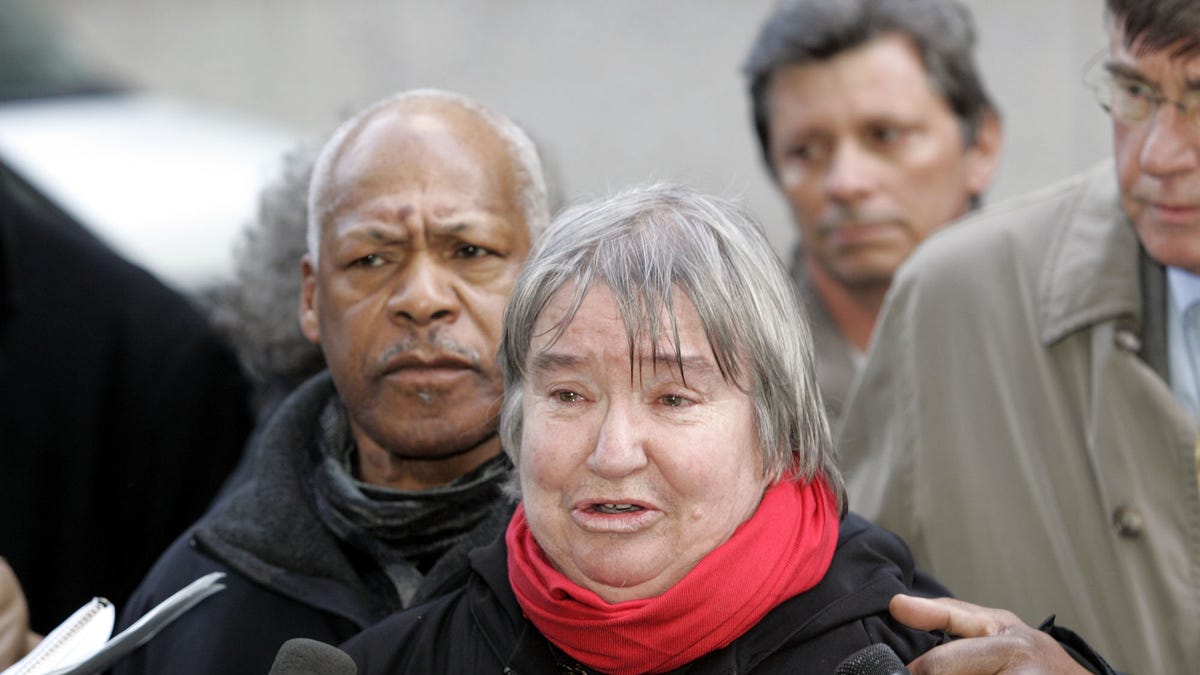
FILE - In this Feb. 10, 2005 file photo, attorney Lynne Stewart cries as she speaks to the press with her husband Ralph Pointer next to her, left, outside Federal Court in New York. Stewart, a former civil rights lawyer convicted in a terrorism case and sentenced to 10 years in prison is entitled to compassionate release because she has less than 18 months to live, prosecutors and the Federal Bureau of Prisons told a judge on Tuesday, Dec. 31, 2013. (AP Photo/David Karp, File) (The Associated Press)
NEW YORK – A dying former civil rights lawyer convicted in a terrorism case and sentenced to 10 years in prison is entitled to compassionate release because she has less than 18 months to live, prosecutors and the Federal Bureau of Prisons told a judge on Tuesday.
In a letter to U.S. District Judge John G. Koeltl, the government said 74-year-old Lynne Stewart was suffering from breast cancer that has metastasized to the lungs and bones.
"Despite aggressive treatment, doctors have advised that her prognosis is poor," the letter said, adding she also has been diagnosed with anemia, high blood pressure, asthma and Type 2 diabetes.
Stewart has been undergoing treatment at the Federal Medical Center in Carswell, Texas, as supporters have rallied to get her released. Once released, the letter said, she will live with her adult son in Brooklyn.
Stewart was convicted of helping a blind Egyptian sheik communicate with followers while he was serving a life sentence in a plot to blow up five New York landmarks and assassinate then-Egyptian President Hosni Mubarak. She has been imprisoned since 2009 and wasn't scheduled for release until August 2018.
She was first diagnosed with breast cancer in November 2005. The cancer went into remission but was discovered to have recurred after she was imprisoned.
Stewart has written to the judge, saying she doesn't want to die in "a strange and loveless place" and wants to go home.
A previous compassionate-release request was denied in part on the grounds that Stewart had more than 18 months to live, though the judge said he would act promptly if the Federal Bureau of Prisons agreed she had less than 18 months to live and granted a compassionate-release application.
A federal appeals court in 2012 upheld Stewart's 10-year sentence, saying she earned it through serious crimes that she refused to acknowledge. The 2nd U.S. Circuit Court of Appeals said it was fair to boost Stewart's sentence from the two years and four months she was given in 2006.
The three-judge panel that had ordered Stewart to be resentenced said it disagreed with her claim that her sentence was "shockingly high." It accused her of exhibiting a "stark inability to understand the seriousness of her crimes."
Stewart's husband did not immediately return a phone message seeking comment on Tuesday.

